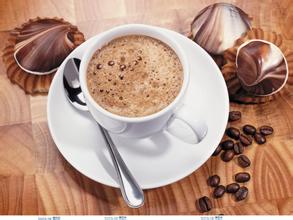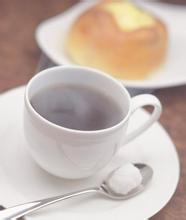Perfectly balanced Jamaican boutique coffee flavor taste manor characteristics Blue Mountain Coffee introduction
Famous coffee is characterized by its origin. Climate and soil quality will eventually bring subtle changes to the taste of coffee. The tropical islands of Jamaica have the perfect conditions for growing coffee. Most of the island is covered by mountains, including the Blue Mountains, which are the highest part of the island. The Blue Mountains is a fertile land, where the hot climate, abundant precipitation and high altitude are perfectly combined. Coffee production is the highest in the world at nearly 7500 feet above sea level.
There are three grades of coffee in the Blue Mountains of Jamaica: blue Mountain Coffee (Blue Mountain Coffee), Alpine Coffee (Jamaica High Mountasin Supreme Coffee Beans) and Jamaican Coffee (Jamaica Prime Coffee Beans). Among them, Blue Mountain Coffee and Alpine Coffee are each divided into two grades. In terms of quality, the order from top to bottom is: blue Mountain 1, Blue Mountain 2, Gaoshan 1, Gaoshan 2, Jamaican Coffee. Coffee grown between 457m and 1524 m above sea level is usually called Blue Mountain Coffee. Coffee grown between 274m and 457m above sea level is often called Jamaica Prime Coffee Beans, and the price of blue mountain coffee is several times higher than that of alpine coffee.
Coffee is not native to Jamaica. Coffee beans were brought to the island by the Governor in 1728. Blue Mountain Coffee has a very pure taste and has a sweet taste. Its taste is mellow, smooth, strong and delicate; pure Blue Mountain coffee has a light taste and flavor, but it is very mellow and delicate; it has aristocratic taste and is the best in coffee. Because the geographical area where it grows is very small, the production of Blue Mountain coffee is also very limited, and sometimes it is even difficult to buy coffee beans that generally grow at low elevations and other areas. They can only be called "Jamaican mountain beans" or "Jamaican water washed beans". Compared with the Jamaican Blue Mountains, the flavor is very different, but the area of these producing areas is twice that of the real Blue Mountains, and the output accounts for 75% of the country's output. So when you buy Jamaican coffee, don't think you've got Blue Mountain coffee.
Because Jamaica Blue Mountain is so famous, there are fake Blue Mountain Coffee on the market, or simply called "Blue Mountain Coffee". Basically, these are all comprehensive products prepared by the store themselves. it is possible that a real Jamaican blue mountain bean does not have the earliest "Jamaican Blue Mountain", which refers to the coffee produced by "Warren Ford Farm" and "Silver Hill Farm". The former is of the best quality. Today's Jamaica Blue Mountains refers to coffee beans growing in the Blue Mountain area east of Kingston, the capital of Jamaica (with a height of more than 1000 meters). Now Mawei is the largest manor, its barrel is printed with M.B.C.F, and its products are often found in Taiwan. The quality control of the Blue Mountains in Jamaica is very strict, and the certification work is carried out by the government's "Coffee Industry Committee".
When the name of Blue Mountain Coffee comes from Jamaica, people's eyes immediately brighten because it produces the best "Jamaican Blue Mountain Coffee" (Jamaica Blue Mountain) in the world. We absolutely believe that Jamaica Blue Mountain Coffee is the best coffee, its acid, sugar, alcohol and bitterness are well balanced, fragrant and smooth to drink, but its price is so high that although it is worth a try, there is no need to be fascinated by it. Because other selected coffees have their own characteristics, and the taste is delicious and the price is reasonable, this is the good coffee in our life, no matter whether you like it or not, you must have heard of it or even drunk it. But most people only know the name Blue Mountain Coffee, but they don't know any other information. Let's introduce the source of Blue Mountain Coffee to you.

Important Notice :
前街咖啡 FrontStreet Coffee has moved to new addredd:
FrontStreet Coffee Address: 315,Donghua East Road,GuangZhou
Tel:020 38364473
- Prev

Characteristics of Panamanian Coffee introduce the flavor and taste of Panamanian coffee in Kasha Manor
Kasha Louise (Casa Ruiz) and his partners follow the environment-friendly way of growing coffee in the Boqui region, but in order to improve the quality of raw beans, they have increased the processing system of raw beans in every environment, including planting, processing, curing, and preservation. Kasha Louise is not only the regular soldier of the best Barnabas Best of Panama, but also Pakistan.
- Next

The taste of the soft and smooth Ethiopian coffee manor is characterized by the taste of fine coffee beans.
This special coffee is made of washed beans from Stammer and Lim, two famous coffee producing areas in Ethiopia. It is moderately roasted and has a soft and smooth taste with a hint of black cocoa, spice and sweet citrus. It is a very delicious and unique coffee, suitable for tasting with dark chocolate and citrus fruits. Recently came to Starbucks stores, customers
Related
- Detailed explanation of Jadeite planting Land in Panamanian Jadeite Manor introduction to the grading system of Jadeite competitive bidding, Red bid, Green bid and Rose Summer
- Story of Coffee planting in Brenka region of Costa Rica Stonehenge Manor anaerobic heavy honey treatment of flavor mouth
- What's on the barrel of Blue Mountain Coffee beans?
- Can American coffee also pull flowers? How to use hot American style to pull out a good-looking pattern?
- Can you make a cold extract with coffee beans? What is the right proportion for cold-extracted coffee formula?
- Indonesian PWN Gold Mandrine Coffee Origin Features Flavor How to Chong? Mandolin coffee is American.
- A brief introduction to the flavor characteristics of Brazilian yellow bourbon coffee beans
- What is the effect of different water quality on the flavor of cold-extracted coffee? What kind of water is best for brewing coffee?
- Why do you think of Rose Summer whenever you mention Panamanian coffee?
- Introduction to the characteristics of authentic blue mountain coffee bean producing areas? What is the CIB Coffee Authority in Jamaica?

